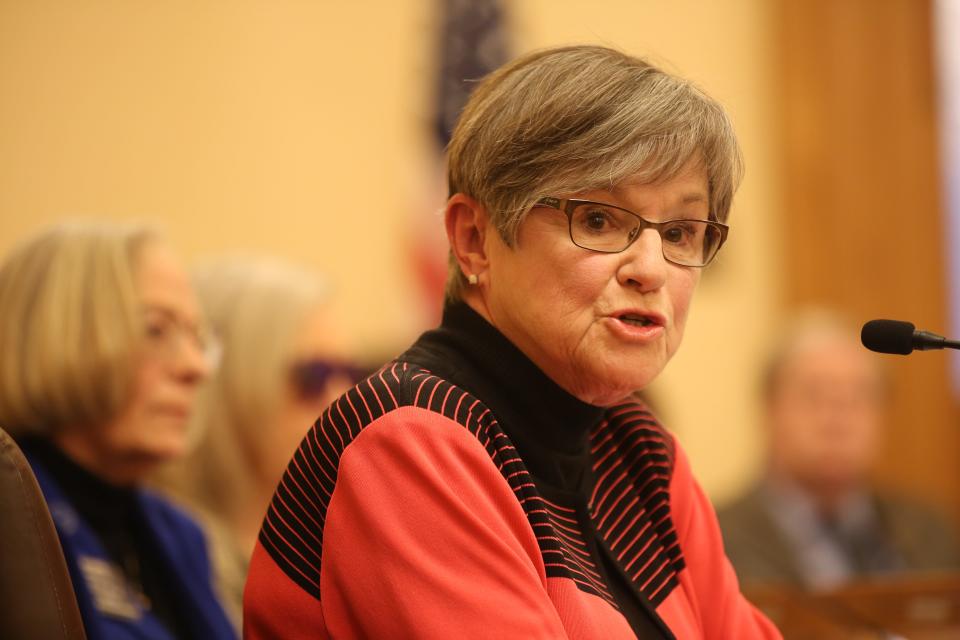Kansas governor asks judge to disregard advisory jury's decision in former KHP head's suit
- Oops!Something went wrong.Please try again later.
A federal judge in January impaneled an advisory jury to give him advice — while making it clear he has final say — in a lawsuit former Kansas Highway Patrol Superintendent Mark Bruce is pursuing against defendants who include Gov. Laura Kelly.
Kelly is now asking that judge to disregard the verdict that advisory jury reached in February in Bruce's favor.
U.S. District Judge Daniel Crabtree must exercise his option of rejecting that verdict, attorneys representing Kelly and KHP Superintendent Erik Smith, the case's other defendant, said in a court document filed April 5.
"When Bruce resigned and retired from State employment, he voluntarily relinquished his proper interest in continued employment," the document said. "No due process violation occurred."
A court document filed the same day by attorneys representing Bruce said Crabtree must sustain the advisory jury's decision, restore Bruce to his former major’s position and provide him equitable financial relief.

What got us to this point?
Bruce was appointed as KHP superintendent in 2015 by then-Gov. Sam Brownback.
Kelly retained Bruce as superintendent after taking office in January 2019. But Bruce resigned March 28, 2019, amid allegations he mishandled KHP sexual misconduct and domestic violence scandals.
Bruce filed a three-count lawsuit in January 2020 against Kelly; Will Lawrence, her chief of staff; and Herman Jones, who followed Bruce as KHP superintendent before retiring last summer.
Crabtree in December dismissed two of those claims, which alleged Lawrence violated Bruce's constitutional right to due process and engaged in tortious interference with a prospective business relationship.
Bruce asked for a jury trial on the one remaining count, but federal law requires the consent of all parties for claims that seek "prospective equitable relief" — which Bruce's does — and the state didn't consent to a jury trial.
Crabtree said in a Jan. 5 court order that he consequently was exercising his option to impanel an "advisory jury" to advise him as to whether members thought Bruce resigned voluntarily.
"In the court’s view, it’s an ideal jury question because the law uses a 'reasonable person' test to determine whether a resignation was voluntary," Crabtree's order said.
An advisory jury can "allow the judge to get some appreciation for the common sense or standard of the community," it said.
Advisory jurors heard testimony regarding the remaining count during a five-day trial in February.
Bruce contended in that count that his constitutional right to due process was violated when he resigned as superintendent because he wasn't given an option of being terminated as superintendent and returning to his prior rank as a major, from which he was told that he would then be terminated during his probationary period.
The Kansas Supreme Court, after considering the matter at Crabtree's request, ruled in 2022 that anyone holding the rank of major is in fact a classified worker, adding that an officer who returns to that position from superintendent doesn't have to serve a probationary period.
Bruce's attorneys attempted to have Kelly subpoenaed to testify at the February trial but Crabtree issued an order quashing that. Kelly's testimony wasn't absolutely needed to resolve any of the questions involved, Crabtree said.
Crabtree directed advisory jurors in February to decide if Bruce resigned voluntarily or was coerced into resigning, therefore effectively being terminated.
If Bruce was coerced, he is entitled to be restored to the major's rank he held before becoming superintendent, Crabtree said.
If Bruce resigned voluntarily, Kelly didn't violate his due process rights, Crabtree wrote in his order issued Jan. 5.
Bruce was coerced into resigning against his will, the advisory jury concluded at the trial in February.
Though the vote was 6-1, which wasn't the unanimous verdict Crabtree had asked jurors to reach, attorneys for both sides had agreed the previous day that they would be willing to accept a 6-1 verdict.
Crabtree issued no ruling at the February trial but indicated that attorneys for the two sides would need to submit to him written documents sharing arguments regarding unresolved questions, including whether he should follow the advisory jury’s verdict.
Contact Tim Hrenchir at threnchir@gannett.com or 785-213-5934.
This article originally appeared on Topeka Capital-Journal: Kansas governor asks judge to disregard advisory jury decision in suit

